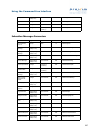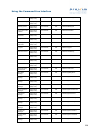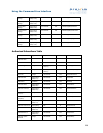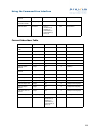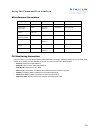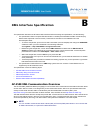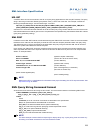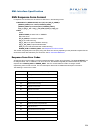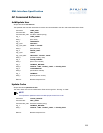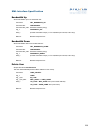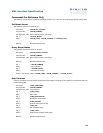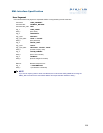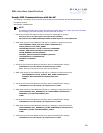
234
XML Interface Specification
XML Response Form Format
In response to a command, the AP returns an XML form in the following format:
<USG RESULT="(RESULTCODE)" ID="(UI)" IP="(AP_IP_ADDR)">
[<ERROR_NUM>(error number)</ERROR_NUM>]
[<ERROR_DESC>(error description)</ERROR_DESC>]
<(tag_n) [tag_n_attr = "tag_n_attr_data"]>(data_n)</(tag_n)>
</USG>
where:
(RESULTCODE) is either "OK" or "ERROR".
(UI) is the AP ID.
(AP_IP_ADDR) is the AP's IP address.
(tag_n) is a data name tag.
(tag_n_attr) is an optional attribute name tag.
(tag_n_attr_data) is optional attribute data.
(data_n) is the data associated with a data name tag.
ERROR_NUM and ERROR_DESC, see Response Form Error Codes.
The number of tag/data pairs in the query string and return form will vary depending on the parameters required for the
command and the data returned by the command. See AP Command Reference.
Response Form Error Codes
All response forms returned after a command request will always contain error information. The attribute RESULT will
be assigned either "OK" or "ERROR.” If an error did occur, two additional tag/data pairs will be added as part of the
response form: ERROR_NUM and ERROR_DESC. The error number data will contain an integer number
representing the error that occurred. The error description data will be a readable text description of the error.
The following is a list of error codes:
Error No. Error Description String
100 Parsing error
101 Unrecognized command
102 Required attribute is missing
103 Required data is missing
200 Unknown room number
201 Unknown user name
202 Unknown user MAC address
203 Incorrect password
204 Username already present
205 Too many subscribers
206 Unable to provide all requested data
207 AAA internal error
300 User RADIUS account not found
301 User RADIUS authorization denied
302 User PMS authorization denied
303 Unsupported payment method




